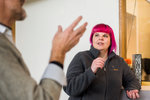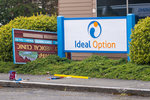




Centralia’s newest addiction treatment clinic opened its doors on Monday.
“Ideal Option is committed to connecting people to the resources they need to rebuild their lives and relationships from the devastating effects of addiction,” Senior Medical Director Dr. Brian Dawson said in a press release.
Lewis County’s opioid prescription rate was one of the highest in the state, with 77.9 per 1,000 residents in the second quarter of 2019, according to the Washington State Department of Health.
Through the opioid prescription rates have been steadily dropping since 2015, Lewis County was still identified by the U.S. Department of Health and Human Services as a “high need county” for opioid use disorder treatment.
Before Monday’s opening, The Chronicle got an early tour of Ideal Option addiction treatment clinic by Nurse Practitioner Geoffrey Godfrey and Community Outreach Coordinator Rose Symotiuk to explore their not-so-unique-anymore approach to treating addiction.
Back in 2012 when Dr. Jeff Allgaier and Dr. Ken Egli founded Ideal Option, they were in the minority of doctors who were trailblazing a different path to curing substance use disorder, Godfrey says.
Now in 2020, with 65 offices across eight states and much more data to back their methodology, Godfrey says the treatment plans they use have entered the mainstream.
Both Godfrey and Symotiuk said Ideal Option’s foundation is built on three pillars: providing evidence-based treatment, offering a low-barrier clinic and being community-driven.
Evidence-Based Treatment
Ideal Option uses medicated-assisted treatment, meaning they pair medication with counseling, therapy and group support.
Their drug of choice to treat opioid use disorder: Buprenorphine/naloxone, sold under the brand name Suboxone.
Suboxone has risen in popularity partially due to the success Ideal Option has had administering it, Godfrey said. He added that data, mostly gathered by the American Society of Addiction Medicine, supports using a drug like Suboxone rather than Methadone, another commonly used medication to treat opioid use disorder.
Godfrey acknowledges that Methadone works for some people and even might allow some patients to feel better in the short term, but said the data suggests Suboxone leads to better success rates in the long run.
Success rates for Suboxone range from 40 to 50 percent while the success rate for Methadone has usually hovered in the 30s, Godfrey said.
Symotiuk added that Suboxone, when used properly, doesn’t make the user feel high like Methadone can.
Once patients have kicked their withdrawals, which Godfrey says usually takes about a 24-hour period, then they can focus on counseling and therapy.
Godfrey is a big proponent of asking his patients to keep a journal to document how they’re feeling. But there are different strokes for different folks, Godfrey says, and various kinds of therapy are offered.
Ideal Option employs social workers, caseworkers, counselors and mental health practitioners, the release says.
Low-Barrier
“You can’t force anyone to do anything,” Godfrey said.
And that is where the low-barrier approach to an addiction treatment clinic begins. Any treatment that a patient receives, even the act of walking through the front doors at 1740 Cooks Hill Road, is entirely up to the patient, Godfrey said.
Historically speaking, the typical addiction clinic usually requires their patients to do more than what Ideal Option would ask, Symotiuk said.
“The thinking used to be the opposite way,” Symotiuk said. “To receive medicated-assisted treatment you have to go to counseling, and there are actually states that have that law. But the evidence shows that people can come in, have this brief conversation with Geoff, get their medicine, and get better.”
Symotiuk says right now Ideal Option has made a concerted effort to accept any insurance plan a patient has. They also have financial counselors on staff to assist patients who need it.
Currently Ideal Option operates on what they call “patient-friendly hours” which run from 4-8 p.m. on Monday, Tuesday and Thursday and 7:30 a.m. to 11:30 a.m. on Wednesdays.
Symotiuk said the clinic wants to expand on those hours but they were chosen specifically for patients who have to balance treatment with work.
Ideal Option has found that a low-barrier approach is not only more palatable for patients, but it is actually more cost effective too, Symotiuk said.
Community-Driven
Just like the other 64 Ideal Option locations, Centralia’s want partnerships with local emergency rooms, county jail systems as well as collaborating with support agencies and municipal programs that address housing, mental health and nutrition support, according to the release.
They also want the medical staff to be comprised of locals too.
“We really, really want to hire (a local practitioner),” Symotiuk said. “It just works so much better.”
Godfrey isn’t naive to the fact that not everyone in a community is as optimistic about the clinic and how they approach addiction treatment as he is.
He says he has been to city council meetings in towns that demographically look just like Centralia where the skeptics might outweigh the advocates.
His sales pitch to the skeptics is fairly elementary.
“Just come down to our clinic and see it for yourself,” Godfrey said.
He finds that many people who weren’t so sure about the clinic are often surprised that it looks like their physician’s office or their dentist.
But what Godfrey says turns a skeptic into a believer is seeing all the patients who want to make changes in their life and get on the right path.
“When you watch (a patient make) that turn, it is so endearing,” Godfrey said.